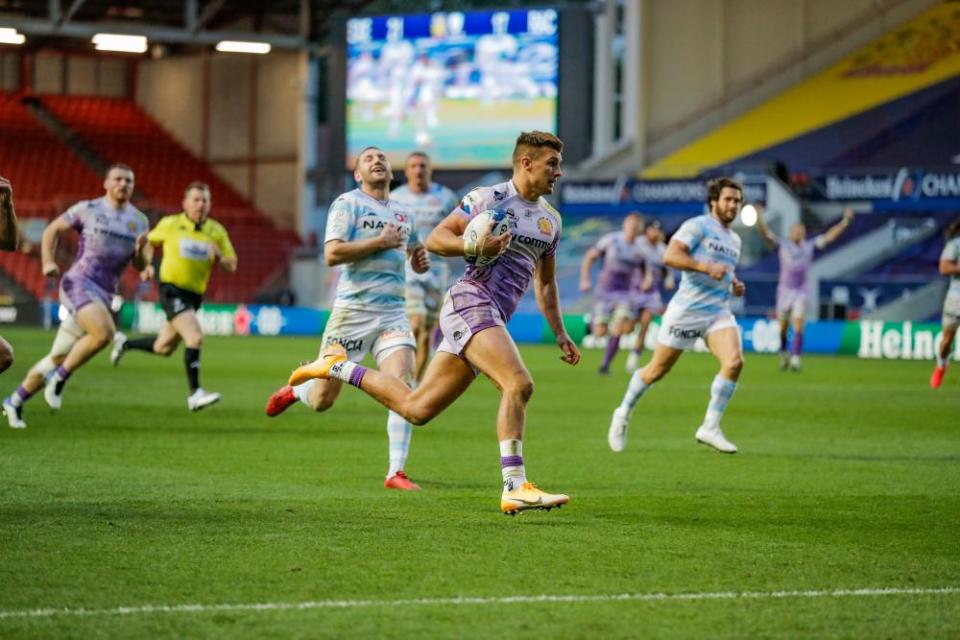Exeter are European champions after dramatic final against Racing 92

Exeter completed a circle in the city where they won promotion to the Premiership 10 years ago. Victory over Bristol at the Memorial Stadium in 2010 took them out of the obscurity of the Championship and they have made progress every season since, culminating in winning the ultimate prize in European rugby after withstanding a late Racing onslaught. The double awaits at Twickenham next weekend.
The Chiefs have become renowned for their mental hardness and after a final in which they again showed their capacity to score tries from close range and keep out opponents, some players were in tears. If, overall, it was not one of Exeter’s most complete performances of the season as they saw an early 14-point lead whittled away to the extent that they were hanging on at the end, a man short after Tomas Francis was sent to the sin-bin for a deliberate knock-on, the way they threw everything into defending their line as Racing looked to apply the coup de grace said everything about a side that has replaced arch rivals Saracens as the champions of Europe.
Related: Exeter win it the hard way to fulfil Tony Rowe's Europe ambition | Robert Kitson
Exeter have in recent seasons declined to kick penalties, preferring to go for touch and try for seven instead of three. It yielded them 21 points in the opening half when they scored two tries from driving lineouts and another after Luke Cowan-Dickie took a quick tap. And with the ultimate difference between the sides two conversions Racing missed as the side’s shared eight tries, the most scored in a Champions Cup final, Exeter’s approach again yielded profit.
It was Racing who played with freedom, perhaps a little too much. Forced to take chances after conceding two early tries, Finn Russell’s passing opened up Exeter, first for Simon Zebo to score and then for the full-back to create the position from which Juan Imhoff picked up from a ruck and outwitted the defence with a dummy. But they ultimately paid for carelessness against opponents who rarely give second chances.
The scrum-half, Teddy Iribaren, had such a shocking start to the match that he was replaced at half-time by the steadier, facilitating Maxime Machenaud who was a better foil for Russell. Racing had a penalty 40 metres out after a minute and, in the style of Exeter, opted for an attacking lineout rather than three points, but so poor was Iribaren’s kick that the ball went dead without threatening to cross the touchline.
The resulting scrum gave Exeter the position to score their opening try through Cowan-Dickie after Jonny Gray’s lineout take and their second came after two more Iribaren howlers. He followed a reckless pass to Imhoff in Racing’s 22 with a wild one to Russell who was standing in his, admittedly small, in-goal area and dropped the ball, fortunate that Jonny Hill knocked the ball on before touching it down. Another penalty gave Cowan-Dickie the chance to tap and go and Sam Simmonds forced his way over.
Racing, beaten finalists in 2016 and 2018 in matches which failed to produce a try, hit back through Imhoff and Zebo. Though they were conceding territory to Exeter, they carried the ball for 234 metres in the opening half to the opponents’ 99, but risk did not yield reward. When Russell’s chip on halfway was charged down, Jack Nowell hacked on and Racing were forced to concede a lineout five metres out. A penalty followed and over the line rumbled Harry Williams to give the Chiefs a 21-12 interval lead.

Machenaud steadied Racing and Zebo became the fourth player to score two tries in a Champions Cup final when Russell’s long, flat pass gave him room on the right after a driving line-out had been repelled, but Russell then attempted an overambitious manoeuvre outside his 22. The ball fell loose, Nowell picked up and fed Henry Slade with an inside pass and he went over.
Racing felt Slade should have received a yellow card for a high challenge minutes earlier on Imhoff but the referee, Nigel Owens, ruled it was worth no more than a penalty because the initial contact had been on the shoulder.
The Chiefs had a cushion, but Racing were playing with greater belief and they again cut the difference to four points when Camille Chat took two backs over the line after a penalty and driving lineout.
It was Chat’s final act and some of Racing’s substitutions appeared pre-planned rather than a consequence of play. Why remove Zebo? Exeter also brought on replacements and the match became more untidy. There were no tries in the final 30 minutes but there was no shortage of opportunity.
After Machenaud reduced Exeter’s lead to a point with the first penalty of the evening, Racing held the initiative for the first time. They launched wave after wave of attacks and when Francis stuck his hand out to deny Imhoff a pass, the Chiefs had nine minutes to cling on.
Racing tried everything but their forwards were held up and when Russell gave the game width, the Chiefs scrambled as if their lives depended on holding on to the lead. After 19 phases, the No 8, Antonie Claassen, looked to have found his way over the line, only to be held up short by the replacement scrum-half Sam Hidalgo-Clyne, who won a penalty. If there had been a crowd, the roar would have been heard in Exeter.
There were three minutes left and when Exeter were awarded a penalty 45 metres out, they debated whether to kick to touch. This time three points meant everything and Joe Simmonds, faultless from the tee all night, secured them. Racing thought they had time to take the restart, but lost seconds were discovered by the fourth official and Exeter had made history.
Again.

 Yahoo Sports
Yahoo Sports 